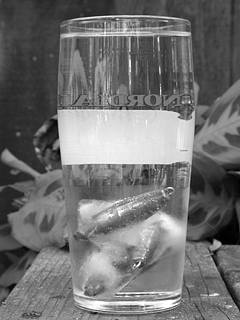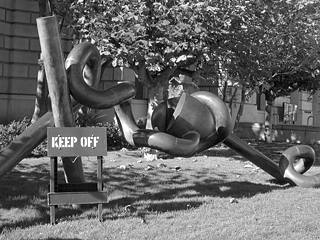
- 12 November 2001
- Three Submersed Ice Cubes
- For years, I’ve entertained unfocused notions about making art using a plumb bob. I thought I might suspend it from a great height, or perhaps bury it. Or perhaps both. Or perhaps not.
As usual, my indolence triumphed over my ambition, and I never did anything except make a few notes. The obstacle was finding just the right plumb bob. It would, of course, have to be the perfect candidate. The problem was that I never go to stores that sell plumb bobs.
Just the other day, though, I was reveling in the golden glow of a delicious burrito while walking down Market Street in San Francisco. I saw a sporting goods store, and decided to buy some fishing line. I figured it would come in handy if I ever decided suspend a plumb bob from a great height.
And that’s when I discovered the lead sinkers. I bought three sinkers; they were more or less identical except for variations in the lovely patinae of small marks, scratches, and gouges. The sinkers shared many of the attributes of a real plumb bob, and the soft lead was as accurate as hard brass for my aesthetic purposes.
After admiring the sinkers for several days, I made my first sketch with them, Three Submersed Ice Cubes. I liked the image of ice cubes motionless at the bottom of the glass instead of floating at the top. Of course, I can’t drink the beverage without the risk of lead poisoning.
A drink that useless could only be art. Or perhaps not.

- 13 November 2001
- The American Association for Single People
- I’ve heard some silly names for organizations, but none as ridiculous as The American Association for Single People. Unless, of course, the Association has only one member, in which case The American Association for Single People makes as much sense as anything else.

- 14 November 2001
- 4:20!
- It’s 16:20, or 4:20 in the afternoon, and everybody knows what that means! Or, at least, bikers know. Actually, I just found out what that connotes, or denotes, or something like that. All I know is that I’m pleasantly confused and looking forward to an early dinner.
Can a burrito be far behind?


- 15 November 2001
- Plop Art
- I’m not sure what to make of “public art.” I keep thinking back to the debate Leo Tolstoy had with Lewis Baltz a few years ago, in which the former maintained good art is accessible art, with the latter suggesting that most people don’t have the aesthetic vocabulary necessary to appreciate recent work.
For most contemporary art, including mine, I agree with Lewis. But when it comes to public art, I have to agree with Tolstoy. Anyone can easily avoid small galleries, obscure Internet sites, and rare publications, but hundreds of thousands of people have to see what a tiny percentage of their taxes have funded.
If they’re very lucky, arts bureaucrats will have managed to fund something that’s both fairly good and not very esoteric. It’s much more likely, though, that civic authorities will have dropped some alien piece into the middle of a public space.
The best description I’ve heard of such work is, “Plop Art.”
I saw a typical piece of plop art when I was walking down Van Ness Avenue. The sculpture was a jumble of tubular, twisty, solid metal pipes. Plop!
I couldn’t find a reference to the artist, or to the person who recently modified the work. An anonymous contributor used a heavy metal chain and a large padlock to attach a sawhorse to the piece. S/he used white paint and a stencil to add the words “KEEP OFF” to the sawhorse.
Or maybe I’m mistaken. For all I know, the same artist who made the doodley bits also made the sign. Or perhaps a crude curator decided to use a sawhorse, a chain, and a padlock to label the piece. I’m too lazy to do even a cursory survey, but I suspect that over half of all public art pieces are titled, “KEEP OFF.”

- 16 November 2001
- Another Nocturnal Memory Failure
- I didn’t sleep well last night. Around three in the morning, I awoke so slowly from a dream that I remembered all the brilliant ideas I had when I was unconscious. That’s when the trouble started.
I knew my ideas were so great that I couldn’t possibly forget them before coffee at dawn. At the same time, I remembered that’s what I’ve thought on hundreds of other nights, and knew that I’d forget everything unless I made a few notes. I spent what seemed like over an hour debating on what course of action or inaction to take. Should I trust my memory and go back to sleep, or should I get out of my warm sleeping bag to put my ideas in writing?
I eventually decided not to trust my memory. I stumbled around in the cold, turned on my computer, made a brief outline of my thoughts, then went back to my cozy bed where I slept until the sun came up.
After a couple large doses of espresso, I went to my computer to refresh my memory. That’s when I discovered I’d only typed three words: “rebemer gallery ideas.”
“Rebemer?!” I couldn’t decide if that was a dyslexic misspelling of “remember,” the name of some gallery, or something else altogether.
Oh well, another nocturnal transmission lost. It happens all the time.

- 17 November 2001
- The Key to ART
- I’m always pleasantly surprised by how much useless information I can glean from the Internet without really trying. Here’s an example of what I found when I told my computer to look for “the key to art.”
“As William Holt of the Institute of Zoology in London points out, the key to ART is a greater understanding of the basic reproductive biology of rare animals.”
I don’t like to be called a “rare animal,” even though I suspect that I may be one. The proposition that everyone is an artist has a certain romantic appeal, even if there’s a dearth of evidence to support it.
I’d never thought of artists having “basic reproductive biology,” though. If that’s true, then that certainly puts a new spin on the “nature versus nurture” debate, and raises the question of whether art is a creative or merely reproductive exercise.
I discussed these questions with my learned friends, who introduced me to a facet of art I never considered before: art as acronym. It turns out that ART is an acronym for Artificial Reproductive Technology.
I’ve never had any interest in Artificial Reproductive Technology, but my friend Cat has. She told me that one of the highlights of her life was electroejaculating a Florida panther. She showed me the visual documentation, some of the few photographs I’ve seen that were undeniably ART.

- 18 November 2001
- Women Are Beautiful!
- Patrick and I were listening to the radio station when we heard an amazing story. It turns out that the male brain has a physical reaction to the sight of an attractive woman. The researchers concluded that the response is not learned behavior, but rather a reaction “hard-wired” into the brain.
“Imagine that!” I exclaimed. “Men are attracted to attractive women. Who could have predicted that?”
“I wonder if women are similarly attracted?” Patrick wondered.
“To men or women?” I asked. “Fortunately, all my informal research has led me to conclude that women don’t seem to put a very high premium on having an attractive partner ...”
“Lucky you!” Patrick interrupted. “I wonder if homosexuals have the same strong reaction to members of their own sex?”
“Sounds like another grant proposal for another day,” I said. “Although the life of a worthless artist is the life for me, there are times when I wish I could apply for a science grant to study whether burritos taste good.”
“Maybe you should get a grant to see whether Rainier Ale makes you more handsome,” Patrick suggested.
“Maybe I should,” I agreed.

- 19 November 2001
- Press Conferences for Idiots
- Is there an annoying new style of addressing the press these days? Without a doubt.
Is this irksome way of talking generally used by military flacks? Generally, but the affliction seems to be spreading.
Will this infuriating and vexatious rhetoric go away? Not until military and corporate hacks are smart enough to answer questions other than the simple ones they pose for themselves.
Will it take long for this to happen? In a word, yes.


